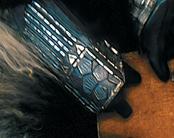Dwarven Bracers (2U3): Difference between revisions
(→Strategy: rewrite to remove the need for separate headers; more rewriting to come) |
(reducing extra space at the top of each article) |
||
| (12 intermediate revisions by 3 users not shown) | |||
| Line 1: | Line 1: | ||
__NOTOC__ | <noinclude>__NOTOC__ | ||
{{NavBar|2U3|[[Mines of Moria Index]]|[[Disquiet of Our People (2C2)|Disquiet of Our People (2C2)]]|[[Endurance of Dwarves (2U4)|Endurance of Dwarves (2U4)]]}} | {{NavBar|2U3|[[Mines of Moria Index]]|[[Disquiet of Our People (2C2)|Disquiet of Our People (2C2)]]|[[Endurance of Dwarves (2U4)|Endurance of Dwarves (2U4)]]}} | ||
{{CardTabs|Dwarven}} | {{CardTabs|Dwarven}} | ||
[[{{ROOTPAGENAME}}]] is a {{C|Dwarven}} [[Possession]] from the [[Mines of Moria]] set. It is the sole member of the "bracers" class. | [[{{ROOTPAGENAME}}]] is a {{C|Dwarven}} [[Possession]] from the [[Mines of Moria]] set. It is the sole member of the "bracers" item class, effectively acting as "limit one per bearer." | ||
{{CardInfobox|2U3}} | {{CardInfobox|2U3}} | ||
{{QueryCardCategories|2U3}}</noinclude> | |||
{{QueryCardCategories|2U3}} | |||
= Strategy = | = Strategy = | ||
'''Dwarven Bracers''' is a core card in [[possession]]-focused {{C|Dwarven}} decks because of its [[strength]] boost and life-saving Response ability. Even a relatively weak [[dwarf]] [[companion]] like {{Card|Farin, Dwarven Emissary}} reaches a respectable 9 strength with Dwarven Bracers, {{Card|Hand Axe}} and {{Card|Dwarven Axe}}, meaning a single {{Card|Flurry of Blows}} is often all it takes to win a skirmish with most minions. Should one of these beefed-up companions lose a skirmish, Dwarven Bracers gives the Free Peoples player an opportunity to trade strength for vitality in a pinch. | |||
Dwarven Bracers, | Because the strength bonus of Dwarven Bracers can itself prevent wounds, it's best to keep the +1 strength from the Bracers on a main combatant as long as possible, rather than immediately sacrificing the Bracers as soon as the bearer takes a wound. Always sacrifice the Bracers if the bearer is on their last wound, of course; they'll get discarded anyway if the bearer dies! However, if you have a copy of Dwarven Bracers in your hand or on a Dwarf character that is less likely to take a wound, then you can sacrifice your main combatant's Bracers to prevent a wound much earlier, because you can replace them in the next [[Fellowship phase]], either from your hand or transferring them from a character in less danger. If you don't have another copy of Dwarven Bracers handy, expending them to prevent a wound is a calculated risk. Is it more useful to avoid a wound now, or will the strength bonus of Dwarven Bracers be necessary to prevent losing a skirmish before the next time you draw a copy or finish the game? There's no one right answer; it will always depend on the availability of healing, how desperate your position is, and how many copies of Dwarven Bracers you're playing. Bracers may be worth holding onto when there is healing around the corner, one point of strength is the difference between a win or a loss (for example, 10 strength defeats many of the [[Uruk-hai]] in [[Fellowship Block]]), another companion can take a wound without risk of dying, or an expendable companion is already nearing the end of their use. Otherwise, losing Bracers is often the least harmful outcome. | ||
Its main weakness is that the benefit is split between two different effects. Wound prevention is a strong effect, and a small strength boost is always useful, but Dwarven Bracers will generally provide less healing than dedicated healing cards, and less strength than a weapon. It also makes your dwarfs more vulnerable to {{Card|Grima, Wormtongue}}, in formats where he is included. As a possession, it can be also discarded by cards that target possessions, but it generally won't be an opponent's first choice unless they're about to finish off a companion that Dwarven Bracers is protecting. | |||
The exact number of copies depends on how many | The exact number of copies to include in your deck depends on how many Dwarfs you have and what the primary use is. The more bearers you have and the more need to protect Dwarfs from wounds, the more useful they are. A small deck that uses {{Card|Gimli, Son of Gloin}} as a throwaway defender might want only want one copy, while a deck focused on multiple Dwarf companions could go up to four without much trouble. It's generally considered more useful than the similar {{Card|Endurance of Dwarves}}. While Dwarven Bracers have a weaker effect than the {{C|Dwarven}} [[ring]]s from Reflections (particularly {{Card|Ring of Fury}} and {{Card|Ring of Retribution}}), there's generally little reason you can't play both, as long as you play only two cards per Dwarf to avoid Wormtongue or protect them with a strategy like {{Card|Slaked Thirsts}}/{{Card|Preparations}}. | ||
= Strengths and Weaknesses = | = Strengths and Weaknesses = | ||
| Line 23: | Line 22: | ||
* {{Card|Gandalf's Cart}}, which can stow extra bracers away to be brought out when needed | * {{Card|Gandalf's Cart}}, which can stow extra bracers away to be brought out when needed | ||
* Recursion such as {{Card|Armor of Khazad}}, {{Card|Well-equipped}}, and {{Card|Honoring His Kinfolk}} | * Recursion such as {{Card|Armor of Khazad}}, {{Card|Well-equipped}}, and {{Card|Honoring His Kinfolk}} | ||
* {{Card|Slaked Thirsts}} and {{Card|Preparations}} to exhaust minions that exert to discard or otherwise remove possessions, particularly {{Card|Grima, Wormtongue}} | |||
== Strong Versus... == | == Strong Versus... == | ||
* Wound-oriented strategies which don't depend on skirmish wins, especially direct wounding such as {{Card|Hate}} or {{Card| | * Wound-oriented strategies which don't depend on skirmish wins, especially direct wounding such as {{Card|Hate}} or {{Card|Ulaire Enquea, Lieutenant of Morgul}} that could otherwise take out a key companion. | ||
== Weak Versus... == | == Weak Versus... == | ||
* {{Card|Grima, Wormtongue}}, | * Possession removal. All possessions are liable to be removed, but be careful of minions that can remove the possession when the bearer is exhausted then immediately kill the bearer, like {{Card|Ulaire Cantea, Faster Than Winds}} | ||
* {{Card|Grima, Wormtongue}}. Wormtongue places a soft limit of less than three cards [[bear|borne]] per [[unbound]] companion, and except for a [[ring-bearer|ring-bearing]] {{Card|Gimli, Bearer of Grudges}}, all Dwarf companions are unbound. In formats where the Shadow player could be playing Wormtongue, Dwarven Bracers compete with not just weapons but also supplemental cards like {{Card|Hand Axe}} (both for its own effects and to enable {{Card|Flurry of Blows}}), {{Card|Endurance of Dwarves}}, and {{Card|Ring of Fury}} and {{Card|Ring of Retribution}}, as well as character-specific items like {{Card|Gimli's Helm}}. | |||
= Rulings = | = Rulings = | ||
The response action of this card will not "stack" with the passive text of {{Card|Gimli's Helm}} to prevent all wounds | The response action of this card will not "stack" with the passive text of {{Card|Gimli's Helm}} to prevent all wounds from a source dealing two or more wounds. Dwarven Bracers will prevent the first, meaning a wound was never taken for Gimli's Helm to prevent any subsequent wounds. | ||
{{RulesQuote | |||
|source=preventing effects | |||
|text=If something happens to prevent one effect which in turn would have prevented a second effect, the second effect is performed.</p> | |||
<p>''Example: {{Card|Morgul Destroyer}} is played. ("When you play this minion, you may spot a Nazgûl to add 2 threats. The Free Peoples player may wound the Ring-bearer to prevent this.") The Free People player wounds the Ring-bearer to prevent the threats from being added. The Free Peoples player then discards {{Card|Sapling of the White Tree}}. (Response: If a {{C|Gondor}} Man is about to take a wound, discard this artifact to prevent that.) Because Sapling has prevented the effect (a wound) that would have prevented Morgul Destroyer's effect, the threats are now added.''}} | |||
= Alternate Versions = | = Alternate Versions = | ||
{{AlternateVersionTable|2U3}} | {{AlternateVersionTable|2U3}} | ||
Latest revision as of 01:45, 1 December 2022
Back to Mines of Moria Index |
Endurance of Dwarves (2U4) |
Dwarven Bracers (2U3) is a Dwarven Possession from the Mines of Moria set. It is the sole member of the "bracers" item class, effectively acting as "limit one per bearer."
| ||||||||||||||||||||||||||||||||||||
| ||||||||||||||||||||||||||||||||||||
| ||||||||||||||||||||||||||||||||||||
| ||||||||||||||||||||||||||||||||||||
Strategy[edit]
Dwarven Bracers is a core card in possession-focused Dwarven decks because of its strength boost and life-saving Response ability. Even a relatively weak dwarf companion like Farin, Dwarven Emissary (1C11)
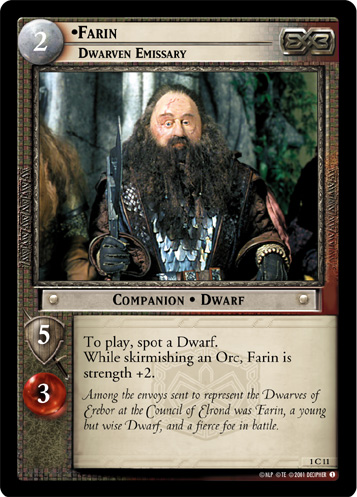 reaches a respectable 9 strength with Dwarven Bracers, Hand Axe (2C10)
reaches a respectable 9 strength with Dwarven Bracers, Hand Axe (2C10)
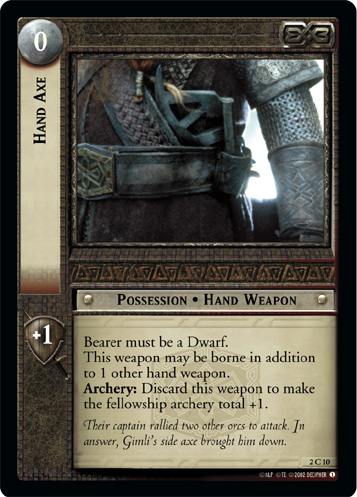 and Dwarven Axe (1C9)
and Dwarven Axe (1C9)
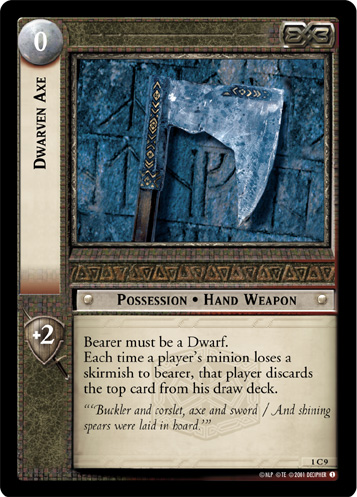 , meaning a single Flurry of Blows (2C5)
, meaning a single Flurry of Blows (2C5)
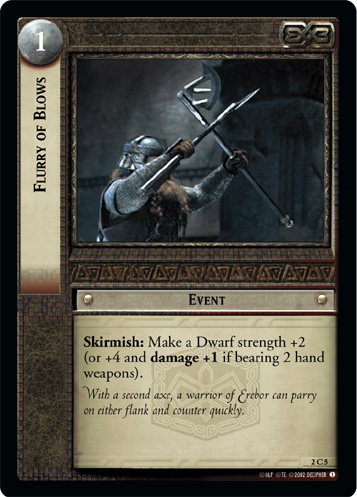 is often all it takes to win a skirmish with most minions. Should one of these beefed-up companions lose a skirmish, Dwarven Bracers gives the Free Peoples player an opportunity to trade strength for vitality in a pinch.
is often all it takes to win a skirmish with most minions. Should one of these beefed-up companions lose a skirmish, Dwarven Bracers gives the Free Peoples player an opportunity to trade strength for vitality in a pinch.
Because the strength bonus of Dwarven Bracers can itself prevent wounds, it's best to keep the +1 strength from the Bracers on a main combatant as long as possible, rather than immediately sacrificing the Bracers as soon as the bearer takes a wound. Always sacrifice the Bracers if the bearer is on their last wound, of course; they'll get discarded anyway if the bearer dies! However, if you have a copy of Dwarven Bracers in your hand or on a Dwarf character that is less likely to take a wound, then you can sacrifice your main combatant's Bracers to prevent a wound much earlier, because you can replace them in the next Fellowship phase, either from your hand or transferring them from a character in less danger. If you don't have another copy of Dwarven Bracers handy, expending them to prevent a wound is a calculated risk. Is it more useful to avoid a wound now, or will the strength bonus of Dwarven Bracers be necessary to prevent losing a skirmish before the next time you draw a copy or finish the game? There's no one right answer; it will always depend on the availability of healing, how desperate your position is, and how many copies of Dwarven Bracers you're playing. Bracers may be worth holding onto when there is healing around the corner, one point of strength is the difference between a win or a loss (for example, 10 strength defeats many of the Uruk-hai in Fellowship Block), another companion can take a wound without risk of dying, or an expendable companion is already nearing the end of their use. Otherwise, losing Bracers is often the least harmful outcome.
Its main weakness is that the benefit is split between two different effects. Wound prevention is a strong effect, and a small strength boost is always useful, but Dwarven Bracers will generally provide less healing than dedicated healing cards, and less strength than a weapon. It also makes your dwarfs more vulnerable to Gríma, Wormtongue (4R154)
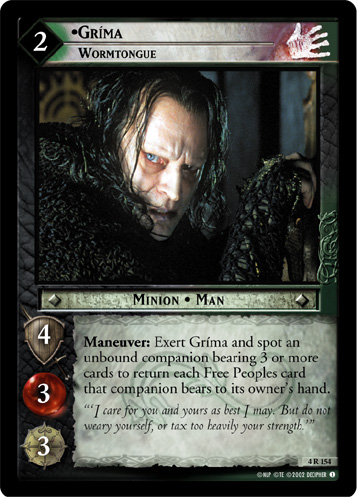 , in formats where he is included. As a possession, it can be also discarded by cards that target possessions, but it generally won't be an opponent's first choice unless they're about to finish off a companion that Dwarven Bracers is protecting.
, in formats where he is included. As a possession, it can be also discarded by cards that target possessions, but it generally won't be an opponent's first choice unless they're about to finish off a companion that Dwarven Bracers is protecting.
The exact number of copies to include in your deck depends on how many Dwarfs you have and what the primary use is. The more bearers you have and the more need to protect Dwarfs from wounds, the more useful they are. A small deck that uses Gimli, Son of Gloin (1R13)
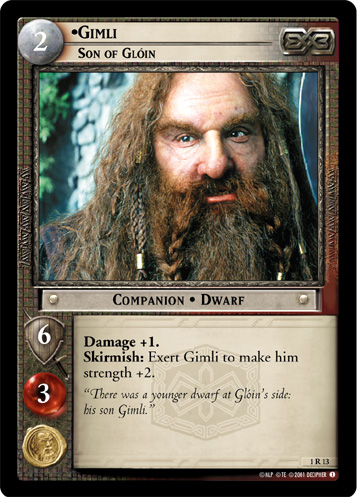 as a throwaway defender might want only want one copy, while a deck focused on multiple Dwarf companions could go up to four without much trouble. It's generally considered more useful than the similar Endurance of Dwarves (2U4)
as a throwaway defender might want only want one copy, while a deck focused on multiple Dwarf companions could go up to four without much trouble. It's generally considered more useful than the similar Endurance of Dwarves (2U4)
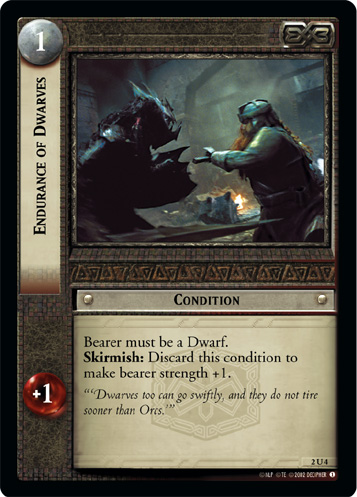 . While Dwarven Bracers have a weaker effect than the
. While Dwarven Bracers have a weaker effect than the Dwarven rings from Reflections (particularly Ring of Fury (9R+7)
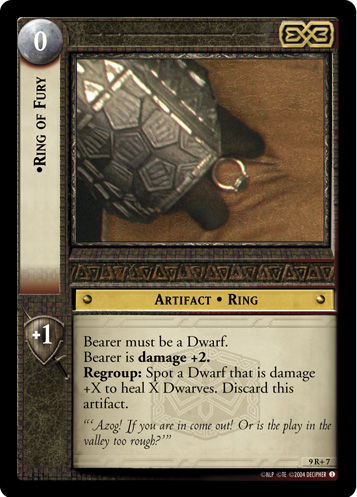 and Ring of Retribution (9R9)
and Ring of Retribution (9R9)
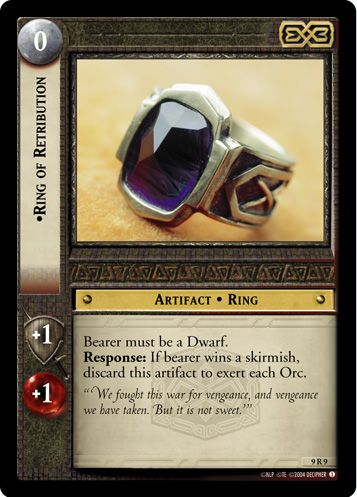 ), there's generally little reason you can't play both, as long as you play only two cards per Dwarf to avoid Wormtongue or protect them with a strategy like Slaked Thirsts (7U14)
), there's generally little reason you can't play both, as long as you play only two cards per Dwarf to avoid Wormtongue or protect them with a strategy like Slaked Thirsts (7U14)
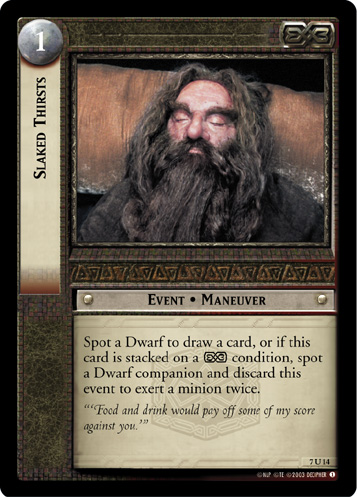 /Preparations (7R12)
/Preparations (7R12)
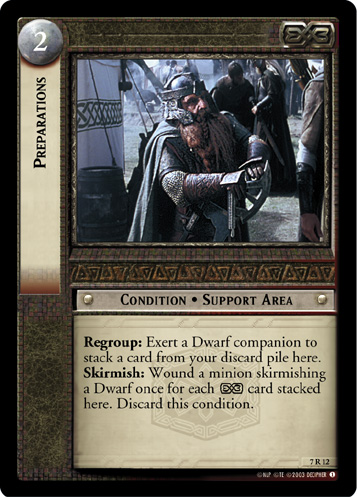 .
.
Strengths and Weaknesses[edit]
Synergizes With...[edit]
- Durin III, Dwarven Lord (9R+3)
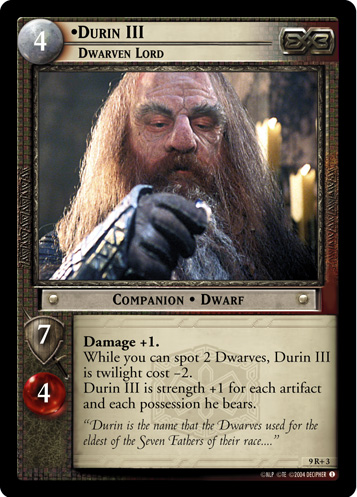 and Thrarin, Smith of Erebor (12U15)
and Thrarin, Smith of Erebor (12U15)
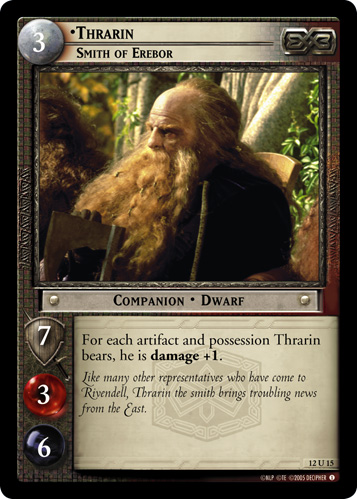 , which typically get as many possessions as the Free Peoples can play on them
, which typically get as many possessions as the Free Peoples can play on them - Self-exhausting companions such as Gimli, Son of Gloin (1R13)
 , Gimli, Counter of Foes (8C5)
, Gimli, Counter of Foes (8C5)
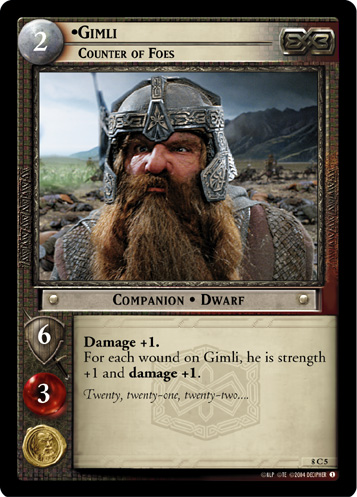 , or Úri, Dwarven Lord (9R11)
, or Úri, Dwarven Lord (9R11)
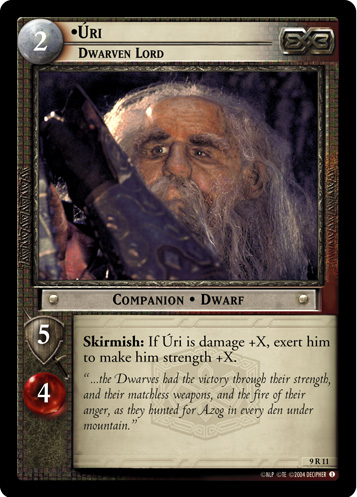 , which often put themselves at risk of getting killed
, which often put themselves at risk of getting killed - Gandalf's Cart (1U73)
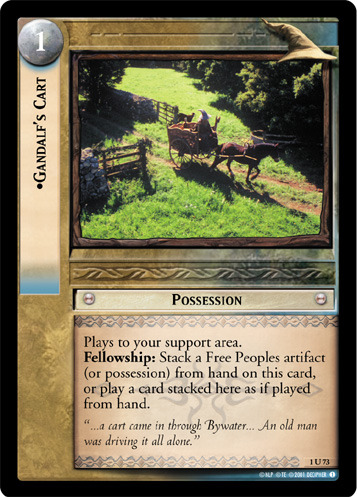 , which can stow extra bracers away to be brought out when needed
, which can stow extra bracers away to be brought out when needed - Recursion such as Armor of Khazâd (17U1)
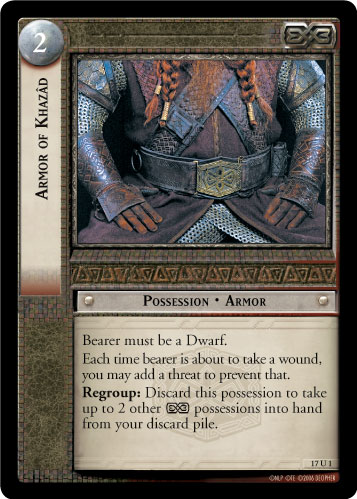 , Well-equipped (11R14)
, Well-equipped (11R14)
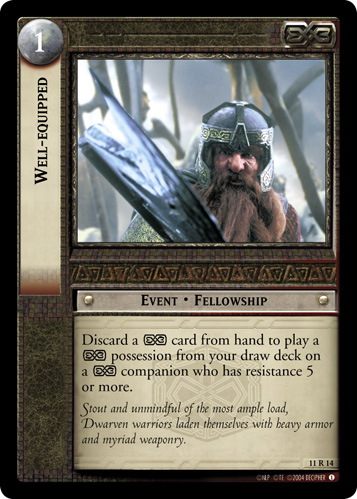 , and Honoring His Kinfolk (13C6)
, and Honoring His Kinfolk (13C6)
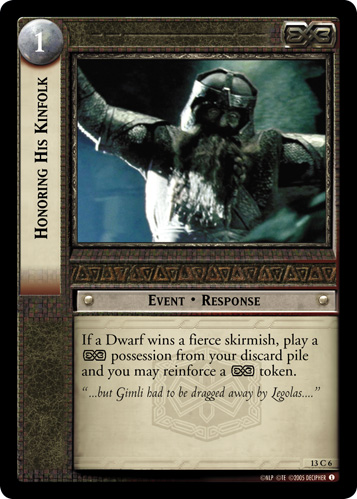
- Slaked Thirsts (7U14)
 and Preparations (7R12)
and Preparations (7R12)
 to exhaust minions that exert to discard or otherwise remove possessions, particularly Gríma, Wormtongue (4R154)
to exhaust minions that exert to discard or otherwise remove possessions, particularly Gríma, Wormtongue (4R154)

Strong Versus...[edit]
- Wound-oriented strategies which don't depend on skirmish wins, especially direct wounding such as Hate (1R250)
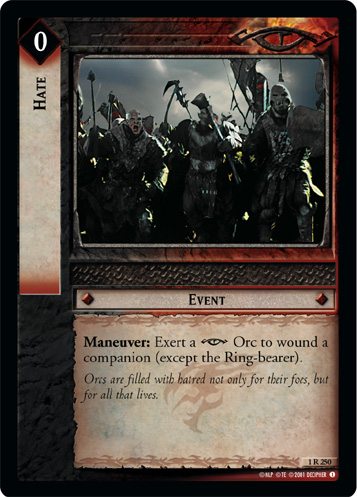 or Úlairë Enquëa, Lieutenant of Morgul (1U231)
or Úlairë Enquëa, Lieutenant of Morgul (1U231)
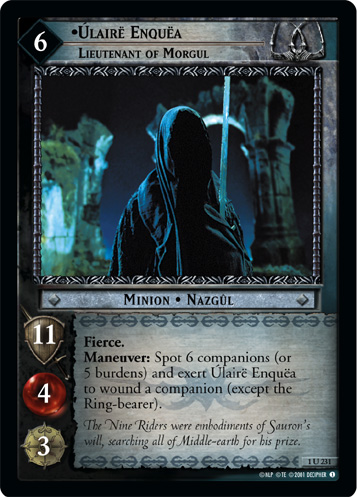 that could otherwise take out a key companion.
that could otherwise take out a key companion.
Weak Versus...[edit]
- Possession removal. All possessions are liable to be removed, but be careful of minions that can remove the possession when the bearer is exhausted then immediately kill the bearer, like Úlairë Cantëa, Faster Than Winds (7R211)
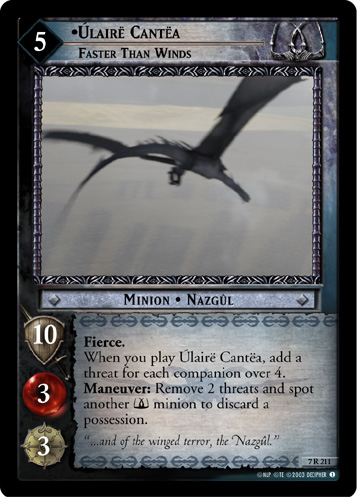
- Gríma, Wormtongue (4R154)
 . Wormtongue places a soft limit of less than three cards borne per unbound companion, and except for a ring-bearing Gimli, Bearer of Grudges (9R+4)
. Wormtongue places a soft limit of less than three cards borne per unbound companion, and except for a ring-bearing Gimli, Bearer of Grudges (9R+4)
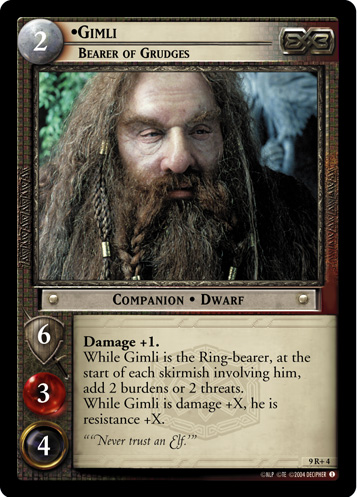 , all Dwarf companions are unbound. In formats where the Shadow player could be playing Wormtongue, Dwarven Bracers compete with not just weapons but also supplemental cards like Hand Axe (2C10)
, all Dwarf companions are unbound. In formats where the Shadow player could be playing Wormtongue, Dwarven Bracers compete with not just weapons but also supplemental cards like Hand Axe (2C10)
 (both for its own effects and to enable Flurry of Blows (2C5)
(both for its own effects and to enable Flurry of Blows (2C5)
 ), Endurance of Dwarves (2U4)
), Endurance of Dwarves (2U4)
 , and Ring of Fury (9R+7)
, and Ring of Fury (9R+7)
 and Ring of Retribution (9R9)
and Ring of Retribution (9R9)
 , as well as character-specific items like Gimli's Helm (1R15)
, as well as character-specific items like Gimli's Helm (1R15)
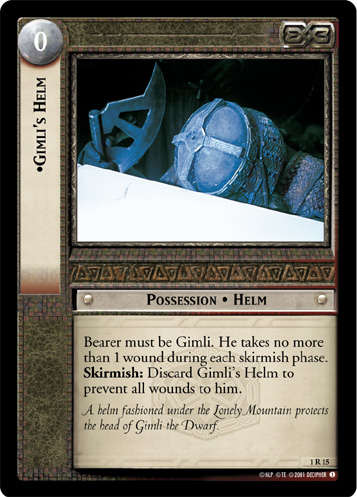 .
.
Rulings[edit]
The response action of this card will not "stack" with the passive text of Gimli's Helm (1R15)
 to prevent all wounds from a source dealing two or more wounds. Dwarven Bracers will prevent the first, meaning a wound was never taken for Gimli's Helm to prevent any subsequent wounds.
to prevent all wounds from a source dealing two or more wounds. Dwarven Bracers will prevent the first, meaning a wound was never taken for Gimli's Helm to prevent any subsequent wounds.
If something happens to prevent one effect which in turn would have prevented a second effect, the second effect is performed.
Example: Morgul Destroyer (7U190)
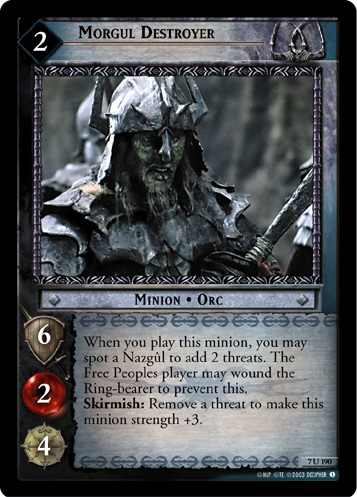 is played. ("When you play this minion, you may spot a Nazgûl to add 2 threats. The Free Peoples player may wound the Ring-bearer to prevent this.") The Free People player wounds the Ring-bearer to prevent the threats from being added. The Free Peoples player then discards Sapling of the White Tree (9R35)
is played. ("When you play this minion, you may spot a Nazgûl to add 2 threats. The Free Peoples player may wound the Ring-bearer to prevent this.") The Free People player wounds the Ring-bearer to prevent the threats from being added. The Free Peoples player then discards Sapling of the White Tree (9R35)
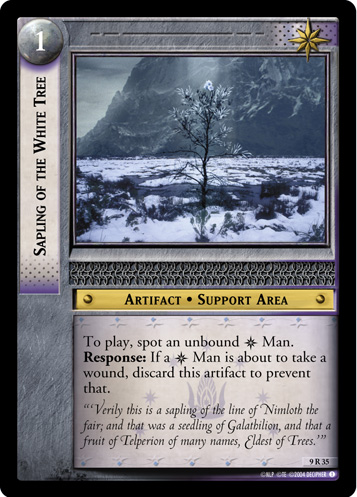 . (Response: If a
. (Response: If a Gondor Man is about to take a wound, discard this artifact to prevent that.) Because Sapling has prevented the effect (a wound) that would have prevented Morgul Destroyer's effect, the threats are now added.
- preventing effects section
Alternate Versions[edit]
| Portrait | Name | Game Text |
|---|---|---|
Dwarven Bracers (12U5)
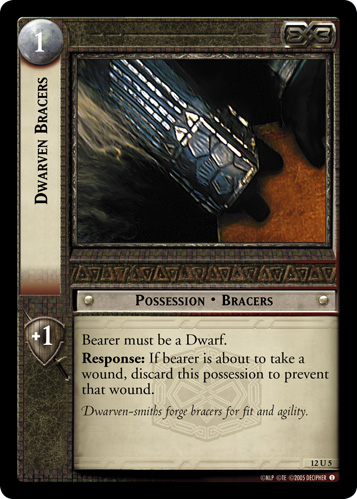
|
Bearer must be a Dwarf.
Response: If bearer is about to take a wound, discard this possession to prevent that wound. |








